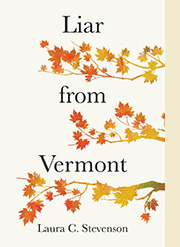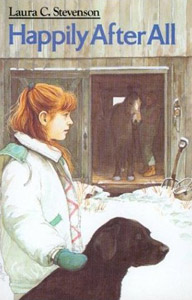A New Series: One Minute Reviews of
Books by Vermont Authors
Laura's column "One Minute Reviews" has appeared bi-weekly in Wilmington, Vermont's Deerfield Valley News since 2015. In April 2018, she found that no Vermont periodical consistently reviews all commercially published fiction and non-fiction by Vermont authors, so she started a series to fill that void. Published reviews from that series and some earlier reviews of local authors are listed with links to a scan of the printed copy. Reviews still in queue are listed without links until they appear in print.
The books reviewed in this series are available through Wilmington's Pettee Memorial Library, the Whitingham Free Public Library, and locally owned Bartleby's Books in Wilmington.
Deerfield Valley News, 6/12/2025
A Poetic Portrait of 1970s Vermont
David Budbill, Judevine: A Love Story for a Place and Its People. Rootstock Publishing, 2025
David Budbill’s Judevine, Vermont, like Sherwood Anderson’s Winesburg, Ohio, is a fictional immortalization of a real place, its people, and its time. Behind Judevine is the Lamoille County village of Wolcott, to which Budbill moved in the 1970s and recreated, over the next twenty years, his neighbors’ lives in eight books of narrative poems, an ever-evolving series of plays, and musical readings in collaboration with the composer William Parker. The present volume, assembled by Budbill’s daughter, offers all the Judevine poems and one of the plays to a new generation of readers. The result is a passionate, compassionate, deeply moving portrait of a lost Vermont.
For the most part, the poet presents himself as a villager—albeit it one who, as a newcomer, is always learning local stories in which the past explains the present. For example, “Hermie,” the piece with which the collection opens, reflects on a departed villager who “lived in a bread truck on the edge/of Bear Swamp.” He cared for it well: “It was always neat in there./It was a good place and cozy.” It gradually emerges, though, that in a drunken fury, Hermie had burned down his family’s house and in another, later, one, he’d torched the shack into which he’d moved. But “Hermie never did anybody any harm;/in fact the night he burnt the home place/he was sure to get [his wife] and the cats out/before he struck the match.” The collective judgment is that Hermie was always
looking for the perfect place.
That’s what all those fires were about.
And in the end he found that place.
The bread truck wouldn’t burn.Behind Budbill’s “villager” pose is a wide-ranging literary heritage. “Crazy Two-foot Makes it Round again,” is a classic collection of twelve calendar poems that sensitively follow the changes in Judevine’s landscape from one November to the next. “Carot’s Pool” is a dream vision in which the poet, dozing off as he admires the beauties of the pond, is suddenly visited by a nightmare vision of the Vietnam War. “The Pulp Cutter’s Nativity” is a play that re-sets the 15th century English “Second Shepherd’s Play” in Judevine, with characters familiar from earlier poems.
The most memorable aspect of the collection, however, is the life it brings to the struggling, impoverished, indominable people of this unknown, unappreciated village. There’s Albert, who according to the town gossip, “knows more ways a makin’ money doin’ nothin’/’an the whole rest athe world put together,” but has turned his trailer into an architectural wonder. Similarly, Roy McInnes, a welder, has designed and built himself a shop that looks like “an early Christian basilica,/or something Gothic,” which “soars—not too high or very gracefully,/but it soars.” Amidst the admiring celebration of unrecognized talents, there are also delicate portraits of unrecognized relationships. There is the celibate couple of Edgar Whitcomb, the postmaster, and Laura Cate, the town clerk, who lunch together every day and walk to church together … and no more. At the opposite end of the spectrum, there is the affair of Tommy, a damaged Vietnam Vet, and embittered, angry Grace—portrayed in the achingly tender/bitter “A Fleeting Animal” poem Tommy writes about their love. The appreciation and understanding of Judevine’s people makes the book, as its subtitle says, “a love song.” To read it is to re-experience—and belatedly appreciate—the forgotten corner of Vermont that David Budbill deeply loved.


